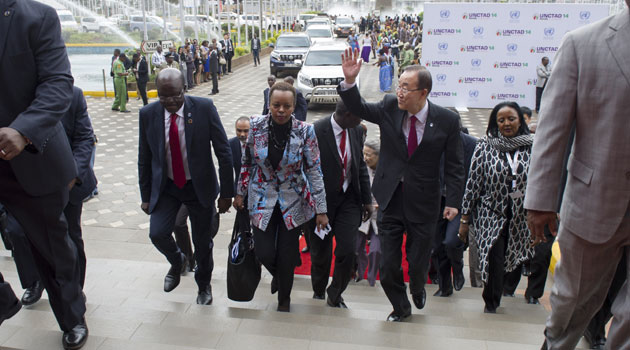
The conference was opened on Sunday by UN Secretary-General Ban Ki-moon in the presence of President Uhuru Kenyatta/COURTESY-UNTCAD
NAIROBI, Kenya, Jul 22 – The 14th United Nations Conference on Trade and Development (UNCTAD) has finally come to a close with the adoption of two crucial documents that will guide the mandate of the agency for the next four years.
“I would like to invite the conference to adopt the text… are there any objections? I don’t think there can be any. And because there are none the Nairobi Maafikiano is hereby adopted,” President of the UNCTAD 14 Ambassador Amina Mohamed said during the conference.
The two documents – Nairobi Maafikio and Nairobi Azimio – are aimed at ensuring fair trade between developing countries and developed nations as well as ensure action is taken on previous agreements.
The Nairobi Maafikiano, which has focussed on four main areas and how UNCTAD is supposed to help its members in moving towards an inclusive and equitable global economic environment for trade and development.
The first area will include the role of UNCTAD in dealing with challenges and opportunities in multilateralism for trade and development.
For example, in the next four years, UNCTAD is supposed to continue its work on the impact of non-tariff measures on trade and development prospect of developing countries.
“UNCTAD should continue to help developing countries to participate effectively in international discussion on technology and knowledge sharing,” part of the document states.
The Maafikiano document has also stated several roles UNCTAD is supposed to play in promoting inclusive and sustainable economic growth through trade, investment, finance and technology to achieve prosperity for all.
This will be mainly aimed at eradicating poverty, job creation, technological upgrading, economic diversification and reduction of income inequality.
The third area of focus for UNCTAD in the next four years will be advancing economic structural transformation and cooperation to build economic resilience.
The fourth area of focus will be contributing to the effective implementation of, and follow-up to the 2030 Agenda for Sustainable Development and relevant outcomes from global conferences and summits as related to trade and development.
“I’m delighted that our 194 member states have been able to reach this consensus, giving a central role to UNCTAD in delivering the sustainable development goals,” UNCTAD Secretary-General Mukhisa Kituyi said.
On the other hand the ‘Nairobi Azimio’ document is a political declaration representing a broad expression of the social and economic state of the world.
“We the member states of the United Nations Conference on Trade and Development agree on the following declaration herein referred to as the ‘Nairobi Azimio’ that is firmly anchored in the heritage of achievements of UNCTAD since its creation in 1964,” the document reads.
Among others, the members commit to uphold the decisions taken at UNCTAD 14 as well as urge members states to fully implements the Nairobi Maafikiano, achieve gender equality and promotion of the youth.
The declaration has reiterated that each member country has a primary responsibility for its own economic and social development.
The conference was opened on Sunday by UN Secretary-General Ban Ki-moon in the presence of President Uhuru Kenyatta and the vice-President of Uganda, Edward Kiwanuka Ssekandi, before running for five days in Nairobi from July 17 to 22.
More than 5,000 delegates from 149 countries attended.


































